Retiring in Spain is attractive for retirees looking to relocate for their golden years. The magical Mediterranean climate, low cost of living compared to other Western nations, and affordable healthcare make it the ideal destination for retirees looking to maximize their savings.
But which are the best places to retire in Spain? To find out, we created a list of 44 towns or cities that regularly feature in these discussions. We then picked 7 factors most important to Expat retirees, including the proportion of retirees and retired Expats, rent price index scores, crime rates, wealth tax rates, most popular destinations for retiree healthcare quotes, and average annual temperatures in each destination.
Almuñécar Is The Best Place To Retire In Spain, With A Score Of 7.56/10
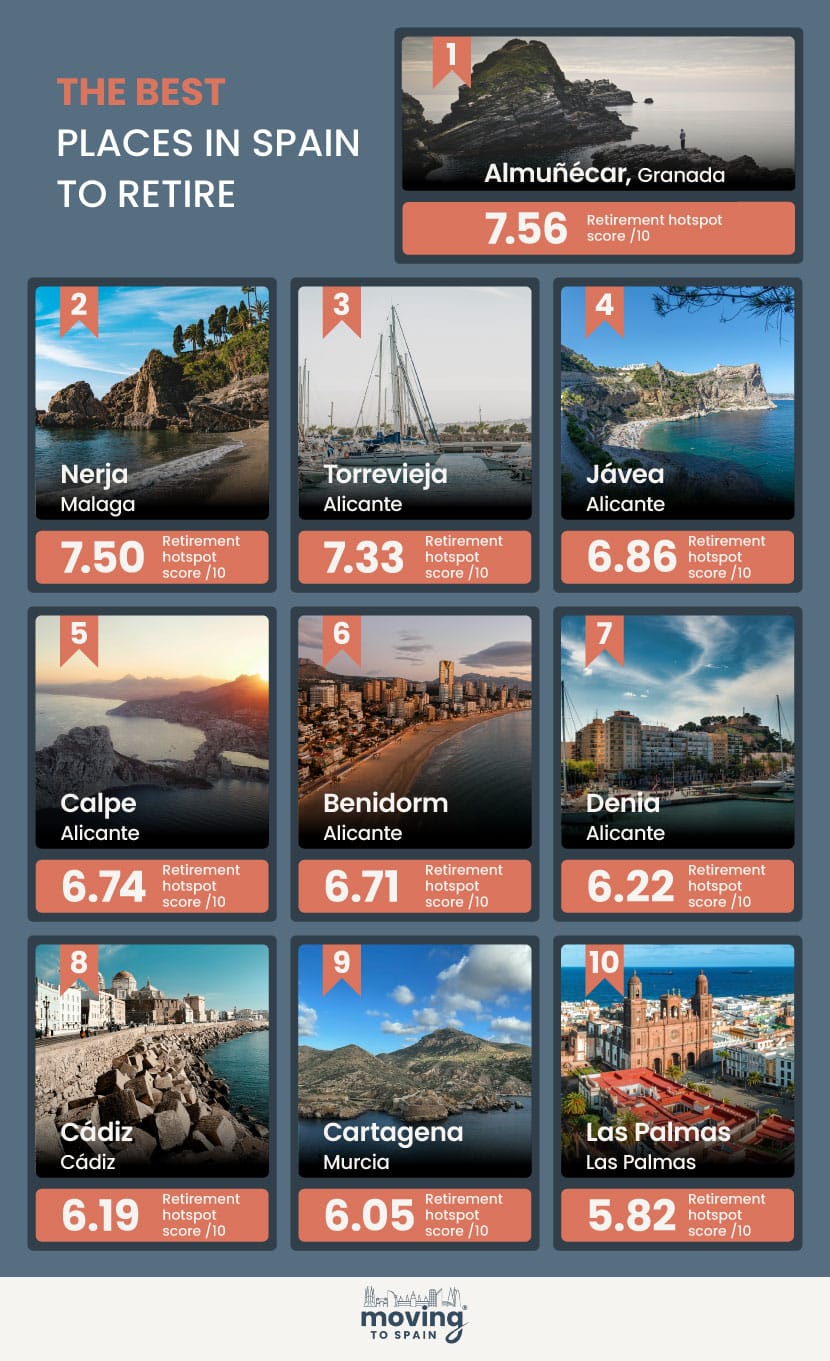
Top 10 Places to Retire in Spain: Detailed Analysis
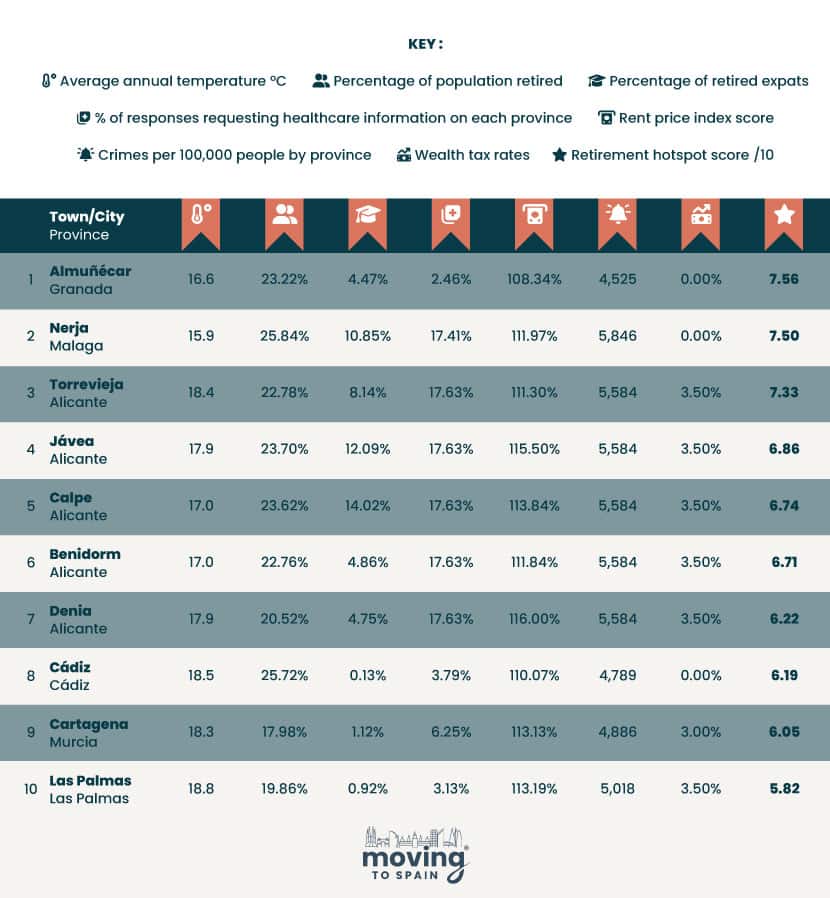
- Almuñécar Retirement Hotspot Score: 7.56/10
Almuñécar, on the southwest coast, takes the top spot and is our best place to retire in Spain. The town scores highly thanks to its low rent price index of 108.34% and its 0% wealth tax rates. It also ranks highly for its proportion of retired expats — at 4.47%, it’s just inside the top ten for the factor.
- Nerja Retirement Hotspot Score: 7.50/10
Up next is Nerja, a town on the country’s Mediterranean coast. The town ranks highly across the board. With its 0% wealth tax rate, it shares first place for the factor. Nerja also ranks third for both its 25.84% proportion of retirees and 10.85% of retired expats. This gives it a retirement hotspot score of 7.50 out of 10 and second place overall.
- Torrevieja Retirement Hotspot Score: 7.33/10
Rounding out the top three is Torrevieja, with a retirement hotspot score of 7.33 out of 10. The city on the southeast coast scores relatively well, placing in the top 10 for four of the seven factors we looked at. Torrevieja has the second-highest percentage of Moving to Spain respondents requesting healthcare information at 17.63% and ranks fourth for its proportion of retired expats at 8.14%.
What More Options? See our full list of 44 towns and cities to see where your picks rank on our long list at the end of the article.
The retirement hotspots with…
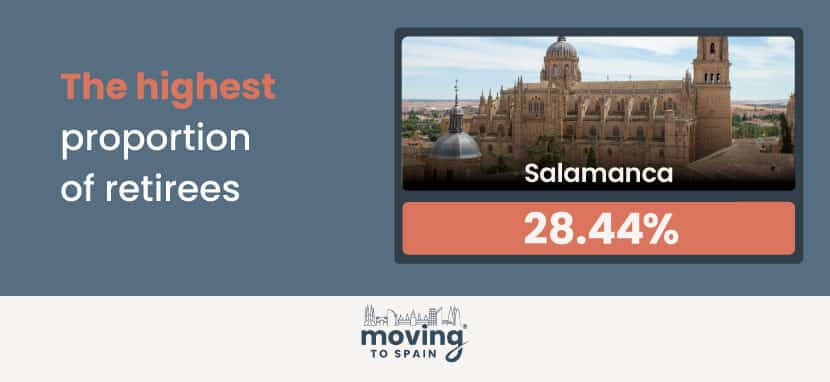
Destinations with a higher proportion of retirees are more likely to have services and amenities tailored to older populations. These can include everything from healthcare facilities to socializing opportunities. Salamanca has the largest retired population rate, at 28.44%.
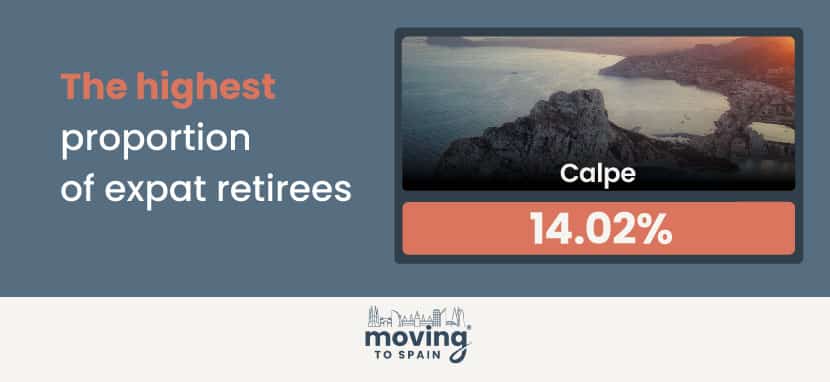
Moving to a new country can be difficult, especially when you are away from family and friends. Luckily, Expat communities can help you transition, providing a support network and opportunities to make new friends. You’re also likely to find people who speak your language to help you get started. Calpe has the highest proportion of Expats over 65, 14.02% of the population.
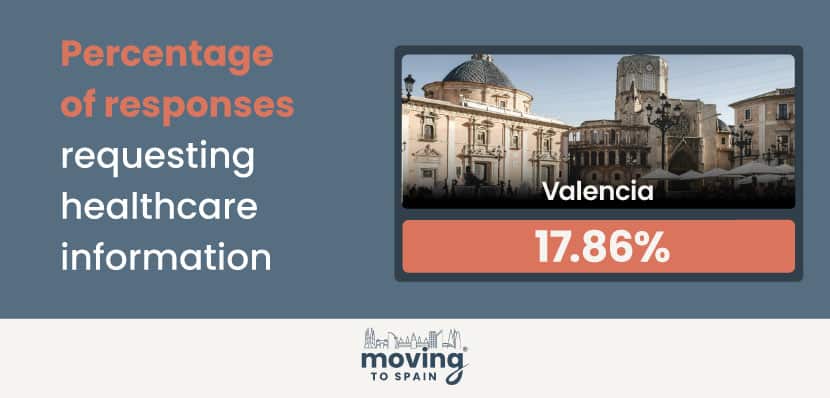
Most people retiring to Spain need private health insurance for their Spanish residency or visa. We analyzed more than 750 recent Spanish private health insurance quote requests from Moving to Spain retiree clients. This data gives us up-to-date real-world information on the areas of highest interest to Expats who are actively looking to retire in Spain. From our analysis, Valencia has the highest percentage of requests, with 17.86%.
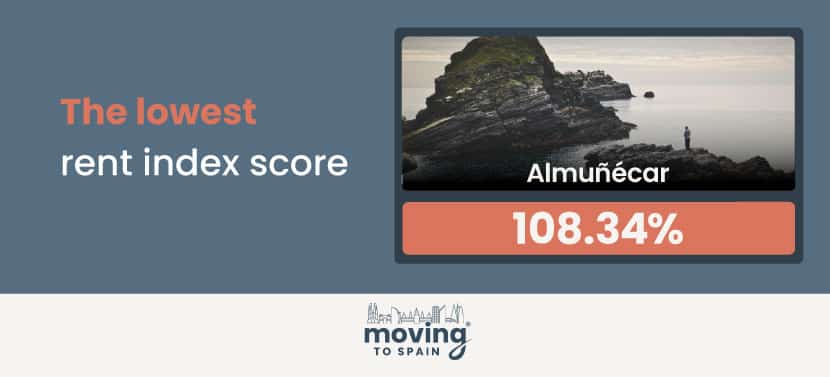
As potential retirement hotspots, it makes sense that rental costs in our 44 cities and towns will be above the Spanish average. We chose the 44 popular cities and towns based on our insider knowledge and a wide range of sources. We compared the average rental prices to the Spanish national average, and Almuñécar has the lowest rent index score on the list, at only 108.34% of the national average.
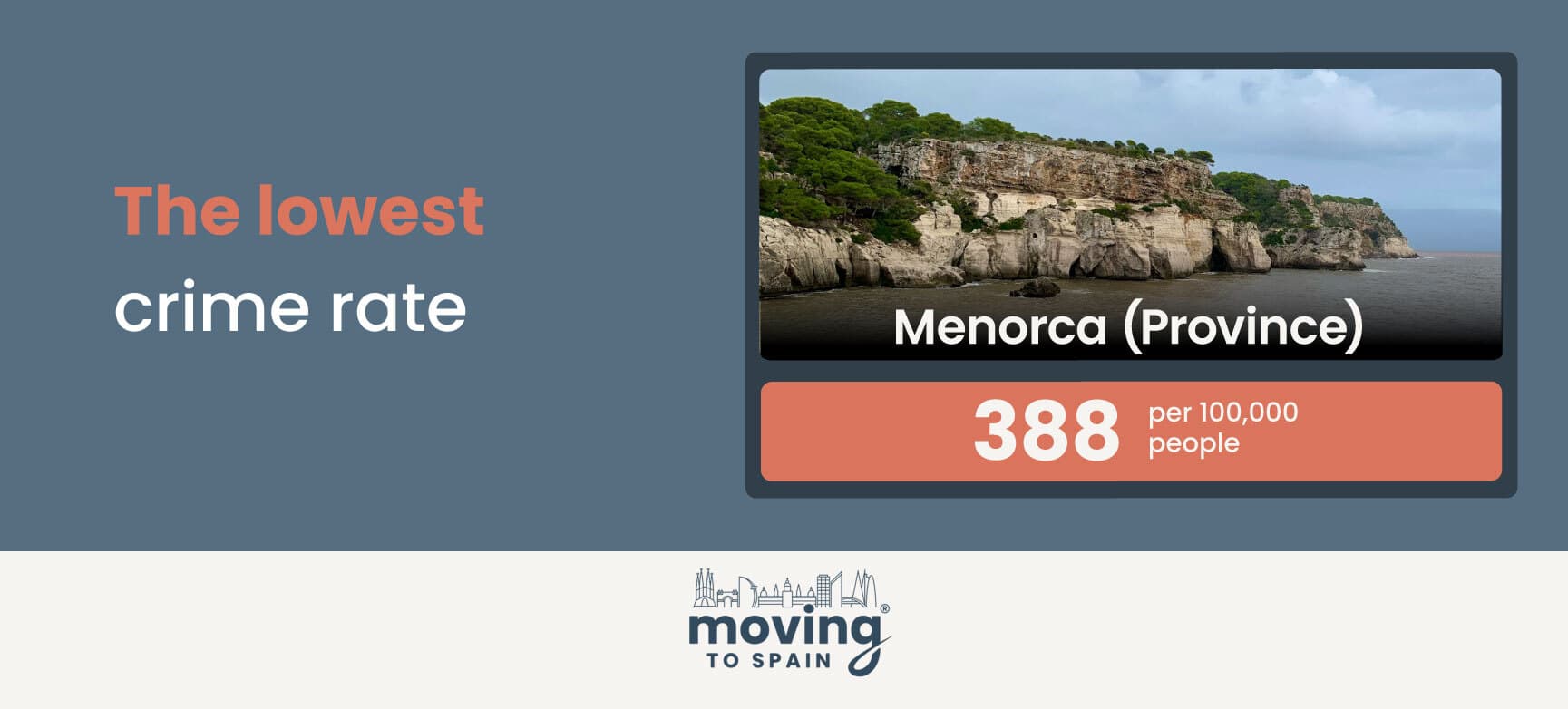
Many retirees prioritize peace of mind, and a low crime rate is a good indicator of this. A lower crime rate means peace of mind and a better quality of life if you don’t have to worry about your safety. You won’t have to worry too much if you plan to relocate to the island of Menorca. It has the lowest crime rate of our 44 destination short-list, at just 388 crimes per 100,000 people each year.

Warmer weather means milder winters, perfect if you plan to relocate for retirement. It can also have some physical and mental health benefits, keeping you outdoors for longer. But remember, this also means that mid-summer can get very warm. Two retirement destinations, Sevilla and Las Palmas, share the title of the warmest avergae tempreture on our list, with an annual average of 18.8ºC.
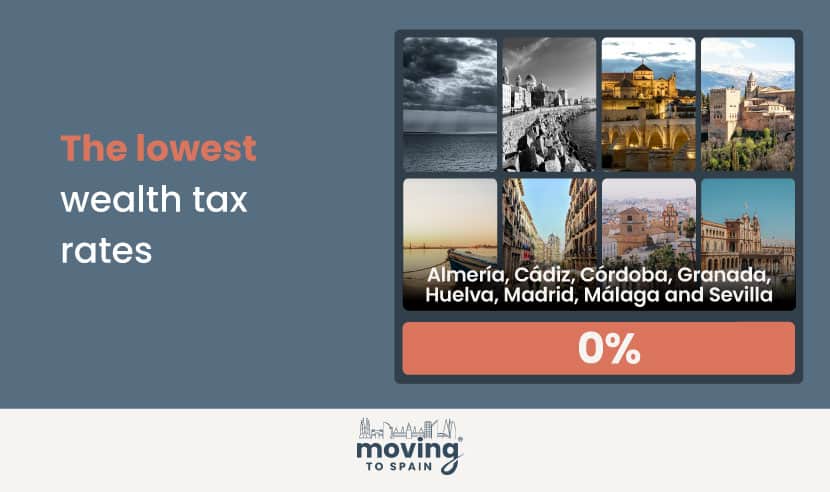
Budgeting enough for your retirement in Spain is a key part of retirement planning. The wealth tax in Spain can be a nasty surprise for Expat retirees as this tax is levied on global assets, including retirement savings. We only look at the headline tax rate here, but remember that there are also differences in deductions that you can claim in different autonomous regions in Spain.
Expert Tips on Retiring to Spain

Warm weather, welcoming locals, excellent food, and attractive living costs are just a few reasons around 8.7 million expats call Spain home. However, if you want to retire in Spain, there are a few things you’ll need to know. With this in mind, we’ve compiled a list of tips to help you through this process.
Choose The Right Visa
Spain offers two main types of visas for retirees emigrating from outside the EU. As our Spanish immigration lawyer partner explains:
The Spain non-lucrative visa, also known as the Spanish retirement visa, requires proof of passive income over €28,000 for the primary applicant. You can also include family members in your application. You’ll also need qualifying private health insurance, as you won’t be eligible for public healthcare.
Raquel Moreno (LLB) – Immigration Lawyer in Barcelona
The second option is the Golden Visa. This is best suited for retirees looking to buy property in Spain. It has requirements similar to those of a Spanish non-lucrative visa, with some exceptions. The Golden Visa requires an investment of at least €500,000 in real estate or €1,000,000 in other investments. The Spanish government has plans to amend or cancel this visa, so if buying a home in Spain is part of your plans, you should act as soon as you can.
These visas are a pathway to Spanish citizenship and an EU passport, making it ideal if you plan to travel outside the country during your retirement.
You must apply for either visa before you move to Spain, so make sure you apply well in advance and have all your proper documentation in order.
Apply for health insurance
Spain has a high-quality public healthcare system, but in most cases, you’ll need private Spanish healthcare as an Expat retiree. Luckily, private coverage is affordable, with monthly policies ranging from €100 to €200.
Look for policies with comprehensive coverage, including for pre-existing conditions and no co-payments to meet your visa requirements. You should also look for policies with a vast network of clinics and hospitals. If you initially need help with the language barrier, ensure your insurance company has a network of English-speaking healthcare providers.
Open a Spanish bank account
Opening a Spanish bank account will make managing your finances more manageable. You won’t have to worry about exchange rates or credit card fees, which can make paying bills and rent costlier.
The best banks in Spain for Expats offer a Spanish IBAN to allow you to work with the Spanish financial system. Look out for low-cost options, as some of the “bricks and motor” high-street Spanish banks have expensive fees. Access to BIZUM is a big plus, too. It’s a simple way to transfer money between people using the phone numbers of your contacts, and we use it almost daily.
Consider the Cost of Living
Spain has a relatively cheap cost of living compared to other European countries. However, it’s best to research a location you can comfortably afford.
Like many other countries, the cost of living in Spain can vary considerably from place to place. Coastal areas and larger cities tend to be more expensive in rent and property prices. Larger cities will also have higher living costs than rural areas, and areas popular with tourists and expats tend to be more expensive than those off the beaten track.
Embrace the local culture
Adapting to the slower pace of life and local customs in Spain can be difficult at first, but it’s essential if you’re committed to retiring to Spain. Start by engaging with your local expat communities to build a support network that can help you ease into your new life.
Join local groups and clubs to meet new people and integrate into the community. Participating in local events is also a great way to immerse yourself in the culture. While many Spanish people speak English, especially in tourist areas, it’s best to learn the basics of the language as soon as possible. Even speaking a little Spanish will make your retirement more enjoyable. Consider joining local Spanish classes to brush up on your Spanish and meet new people in the same situation.
The Long List: The 44 Best Places To Retire in Spain Ranked
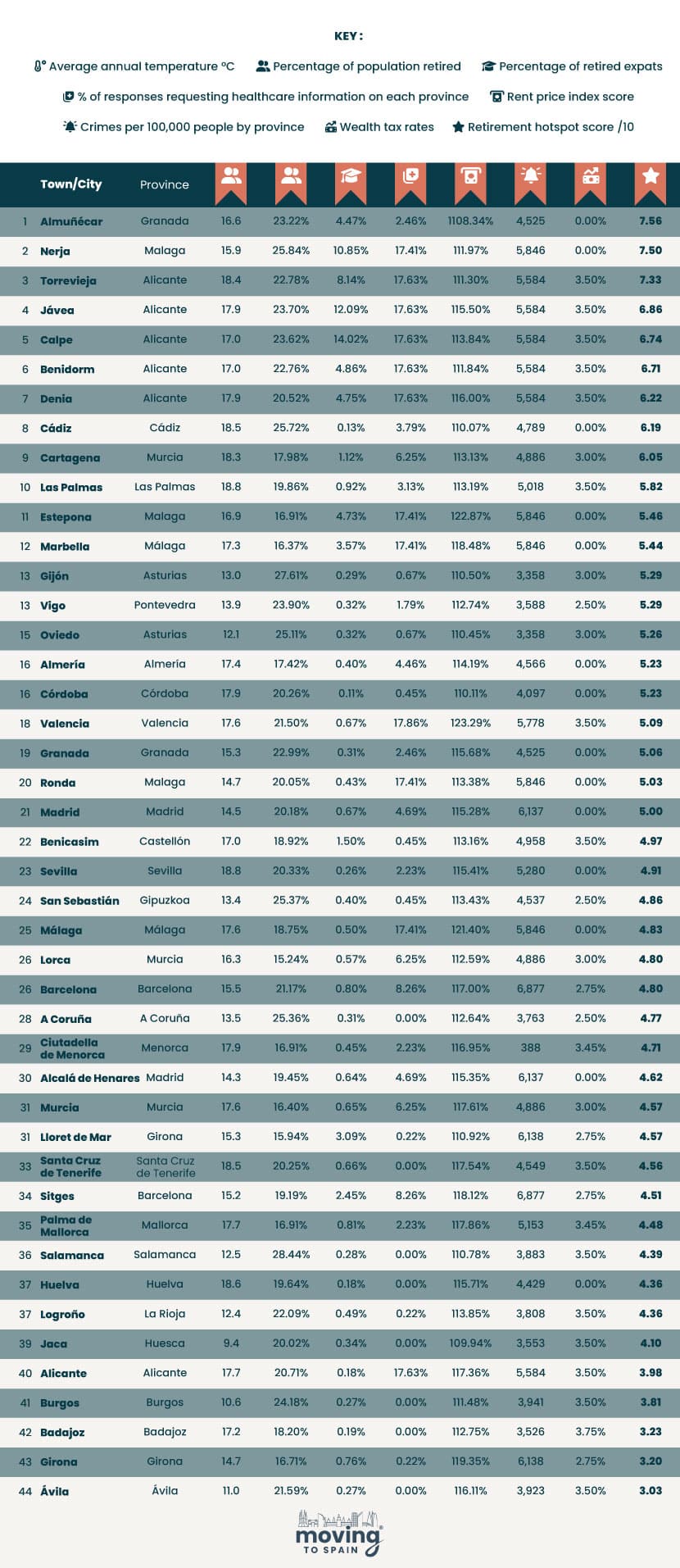
READ ALSO >> Living in Andalucia
Methodology for the Best Places in Spain To Retire Index 2024
We built our long list of 44 Spanish retirement destinations based on client feedback, experience, and many articles and studies. We scored each destination on the factors listed below. We then gave each retirement destination a normalized score out of ten for each factor before taking an average across each of these scores to reach our final overall score out of ten.
- Average Annual Temperature: The average annual temperature in Celsius in each destination according to Climate Data.
- Percentage of Population Retired: The total population in 2021, divided by the number of residents over the age of 65, according to City Population.
- Percentage of Retired Expats: The total foreign population over the age of 65 in 2022 taken from Instituto Nacional de Estadistica divided by the population of each destination
- Percentage of responses Requesting Healthcare Information for Each Province: The proportion of people searching for Spanish health insurance quotes by province, according to our own internal data.
- Rent Price Index Score: The average rent price in 2022 in each destination, expressed as a percentage of the national average, according to Instituto Nacional de Estadistica.
- Crimes per 100,000 people by Province: The total number of crimes in each province in 2023, according to the Ministerio Del Interior, divided by the total population of each province in 2021 according to City Population.
- Wealth Tax Rates: The wealth tax rate for Spain in each region according to La Agencia Tributaria (Spanish Tax Agency).








We’re moving to Spain in a couple of months, can’t wait to get a new start on retired life!
Hi Bill – we’re here for any part of the palnning or move where you need help – all the best with this exciting time! Regards, Alastair
I AM A US CITIZEN AND LOOKING TO RETIRE IN SPAIN,I AM 77 YEARS OLD AND MY WIFE IS 74.
ANNUAL GROSS INVOME IS ABOUT 120,000 DOLLARS.
MY MAIN CONCERN IS HEALTH CARE FOR THE BOTH OF US ,WE ARE BOTH CURRENTLY ON MEDICARE AND HAVE EXCELLENT HEALTH CARE IN USA.
ANY ASSISTANCE WILL BE APPRECIATED.
WE WILL BE RENTING .
Hi Krish – most US Expats living in Spain find the quality of healthcare in Spain excellent and the cost much less than they are used to paying in the US. You can check out our article on Spanish Health Insurance for residency and visa applications or get qualifying quotes from health insurance companies in Spain. Regards, Alastair
1. Learn spanish. 2. If you are racist or support Trump in any way, STAY HOME. 3. Spanish health care insurance is obligatory and will cost less than your Medicare plan b.
I am a US citizen 70 years old and live here for 30 years.
The crime figures from the Spanish Interior Ministry https://estadisticasdecriminalidad.ses.mir.es/publico/portalestadistico/datos.html?type=pcaxis&path=/DatosBalanceAnt/20234/&file=pcaxis show that there were 1848 crimes recorded in Ciutadella in 2023. That works out to 5877 crimes per 100,000 inhabitants, which is 15 times higher than the number in the article.
I think somebody fat-fingered something — it’s inconceivable that the lowest-crime town would have only 10% of the crime of the second-lowest, unless only nuns live there.
Hi Nick – thanks for bringing this to our attention. The crime rates used in the study are for the provinces rather than the specific cities, and the province’s population determines the rate per 100,000. This source should be more transparent in the copy; we will update this. We’ll also update the crime infographic to clearly highlight that this is the data for the province rather than the city. Sorry for the confusion. All the best, Alastair
Ik woon al jaren in Spanje maar jullie beschrijven het wel lekker maar de werkelijk is niet zo rooskleurig hoe jullie het allemaal beschrijven en zeker als je er voor goed gaat wonen en dan ook nog belasting technische weet waar je aan begint
Hi, yes, there is no doubt that Spanish taxation is something every person must consider when planning a move to Spain. We suggest speaking to a cross-border taxation specialist in Spain to understand how taxes impact you (especially given the different regional tax models). All the best, Alastair
I am 77 years old, retired from an international organization in Paris (OECD), US citizen and also receiving social security and hoping to retire in Spain. I receive about $48,000 a year between pensions and social security; I have been living with my family since the pandemic when I sold my house but I am ready to move on. My plan is to spend 80% of the time in Spain and return to see my family on holidays. I would like to live amongst an expat community and a city that has good public transport and be walkable to shops and activities. Do you have a recommendation? international airport access would be a plus. I also speak fluent Spanish since born in the Dominican Republic.
Hi Luz – Spain has several international airports, but not all have flights to the Americas if that is your primary destination. However, connecting flights to Barcelona and Madrid are cheap and regular. I’d suggest starting with the provinces of Alicante, Valencia, and Malaga (both the major cities and surrounding towns and villages) – these cover your main points and are popular with Expats from around the world. All the best, Alastair
Great information, I am 57 retired teacher from US. I had originally planned to retire in Thailand due to its beautiful island life and cost of living but I am rethinking this plan due to the very rainy and humid climate and lack of access to modern amenities unless you are in a nice hotel. Any suggestions for a location in Spain that combines modernity and a great cost of living near the Mediterranean coasts, more specifically I’m looking at your chart for Granada versus Valencia.
Hi Alicia – Spain has all the modern amenities you need, plus it is less humid than Thailand, so you are off to a good start. Around my mid or large-Medeterranian cities, you’ll have access to most amenities, so finding your perfect fit will be the most important. All the best, Alstair
I’ve read wonderful things about Puerto de ma Cruz, Tenerife Spain. Also the largest Canary Island. I’m surprised it’s not on this list. The research Kve done shows it costs under $2k to live comfortably, the weather is amazing -and the island has an expat pop of over 23%.
Some great info, any chance you have one on Extremadura. Currently deciding between that area and Andalusia currently
Hi Mark – We haven’t visited Extremadura, the least populated part of Spain. So, this quick summary is second-hand info! The upsides are the low cost of living, unspoiled nature, amazing cuisine, and proximity to Portugal. Mérida, Cáceres, Badajoz, and Zafra all have great reputations as beautiful and interesting. My online Spanish teacher lives in Extremadura on a large property with five dogs and a few cats… he loves the quiet and peaceful seclusion and the traditional way of life. The downsides – employment opportunities and wages are not good. Summers can be brutally hot, and there is no beach. English capability and infrastructure are less developed than in other parts of Spain. It’s on my list for a visit! All the best, Alastair
Hi Alastair, thank you very much. We will have no need for the beach and won’t be working. Badajoz area was where we were looking at. Heat was our downside too, especially in the later years.
Alastair, Thank you for your reply to Luz, above. Her main points are mine as well.
I will be at the San Antonio Con in a few days. Hope to get even more questions answered.
Biggest, at the moment: How to apply for the NLV. I keep running into obstacles on the website.
The last time I was on the site (a few days ago), for the NLV, they asked for an address in Spain. I’d thought that only came later, after I was scheduled for a consulate visit.
Another time when I was filling out the application for a consulate appointment, it was some other obstacle. I think it was the need for passport photos… to apply for the visa appointment.
(They must be changing the application questions?)
Hope to get some questions like this answered at the Con!
Hi Cheryl. Alison will be able to give some general advice, but the best people to assist are our immigration lawyer partners. They are NLV experts who know the intricacies of each consulate (requirements do differ) and will ensure you have an application that is complete and ready to be stamped before you head off to your meeting. https://movingtospain.com/services/spain-immigration-lawyer/ That leaves you more toime to plan your new life in Spain! All the best, Alastair
Thank you Alastair!
No mention of the beautiful town of Peniscola an hours drive north of Valencia
Hi Don – keep an eye out… our 2025 Update is coming in the next few weeks…